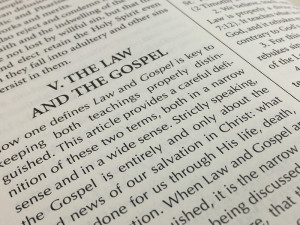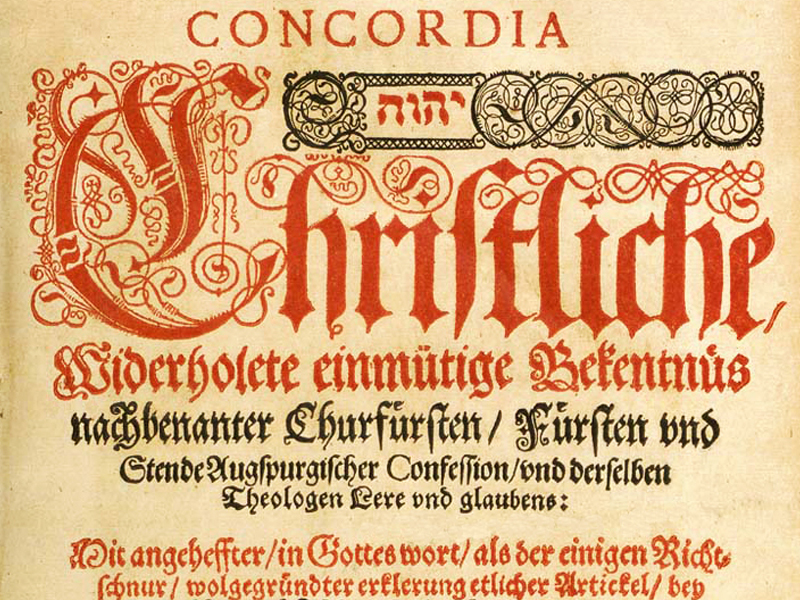by Rev. Aaron Moldenhauer

Near the beginning of The Proper Distinction between Law and Gospel, C. F. W. Walther compiles a list of differences between law and gospel. One point of difference is that the law’s promises are conditional, while the promises of the gospel are unconditional.[1] How tempting and easy it is to confuse law and gospel by attaching conditions to God’s free promise of grace in Christ revealed in the gospel. How easy to turn that promise into something like: “You will be forgiven once you shape up and live right.” Yet Walther’s insight concurs with the fifth article of the Formula of Concord. Both warn against such confusion of law and gospel.
The harm (such as despair, pride, or hypocrisy) arising from a confusion of law and gospel highlights the importance of the question raised in FC V. This article considers whether the gospel is a preaching of repentance that rebukes sin and unbelief. The authors of the Formula conclude that the answer depends on what you mean by “gospel.” Scriptural passages sometimes use “gospel” to include all of Christ’s teaching, including an explanation of the law and the proclamation of God’s grace and favor. When “gospel” is used in this sense, it includes a preaching of repentance along with forgiveness. However, other Scriptural passages contrast these as two separate doctrines, so that repentance and belief in the gospel are two distinct teachings. When “gospel” is used in this sense, it does not include the preaching of repentance. So if the question is resolved by the simple clarification of what a person means by “gospel” in a given statement, why does the Formula say more about the question?
The Formula holds up the distinction between law and gospel to protect both doctrines from confusion and dilution. In order to lay out how the two teachings should be kept distinct, the Formula defines them by both their content and their function. The law is defined as a doctrine that reveals God’s righteous will (content) and threatens transgressors with punishments (function).[2] This definition fits the preaching of Christ, who takes up the law and explains it spiritually. That is, Christ amplifies the law to show the full extent of man’s sin and God’s wrath against it so that no one may imagine that outward works alone will fulfill the law.[3] Law is confused with gospel when the law is softened to allow people to think that they have fulfilled the law by their own works.
The gospel in its narrow sense, not including the rebuke of sin, is the preaching of God’s grace in Christ Jesus in whom we receive forgiveness (content). It comforts the sinner by granting the Spirit, grace, and forgiveness (function).[4] When the gospel is confused by turning it into law, Christ’s merit and benefit are hidden. That is, whenever salvation is based not on God’s free gift but on a person’s obedience, the gospel becomes a law. This robs sinners of the comfort of the gospel.[5] Here, like Walther, the Formula warns against the error of attaching conditions to the gospel.
Rather, the Formula bids that both law and gospel, properly distinguished, be preached within the church.[6] In one of its more difficult but insightful passages, the Formula contends that the proclamation of Christ’s suffering and death can be a proclamation of either law or gospel. This passage depends on functional definitions of law and gospel, for the content here is the same—the suffering of Christ. When Christ’s suffering is a declaration of God’s wrath, showing what great things God requires in the law, it is not yet a proclamation of the gospel. But when Christ’s suffering is preached according to his proper office that offers grace, consoles, and gives life, then it is a preaching of the gospel.[7]
Articles V and VI of the Formula are to be read in conjunction with one another for a full understanding of God’s law. The sixth article takes up the question of the third use of the law as instruction in godly living, and determines that this is a proper use of the law. At the same time, the fifth article emphasizes that the third use of the law ought not become an occasion for hypocrisy and pride.
Study Questions:
- Read Article V in both the Epitome and the Solid Declaration. Identify the different passages that offer definitions of law and gospel. Compile a list of passages that speak of the content of law and gospel, and another list of passages that speak of their function.
- Read the sermon on the Mount (Matthew 5–7). Identify the passages where Jesus takes the law and explains it spiritually. How well have you kept the requirements of the law as Jesus explains them?
- Read Romans 5. What words here correspond to the Formula’s definition of law? Of gospel?
- In Galatians, Paul contrasts a false gospel with the true gospel (Galatians 1:6–9). Read Galatians 3, where Paul contrasts these gospels by contrasting works of the law with hearing with faith. What does faith grant that works of the law cannot give?
The Rev. Aaron Moldenhauer is associate pastor of Zion Lutheran Church, Beecher, Ill.
[1] C. F. W. Walther, The Proper Distinction between Law and Gospel, trans. W. H. T. Dau (St. Louis: Concordia Publishing House, 1986), 7–11.
[2] FC SD V.17.
[3] FC SD V.10.
[4] FC SD V. 6, 20–22.
[5] FC SD V.27.
[6] FC SD V.23–27.
[7] FC Ep. V.9–10.
